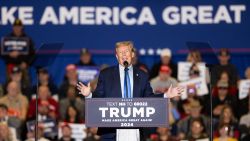William Barr has started discussions on how to handle two significant decisions awaiting him as attorney general: what to report to Congress about the special counsel’s Russia investigation findings and who will be his deputy attorney general, according to people briefed on the discussions.
Barr, expected to win Senate confirmation later this week, has been consulting with top Justice Department officials on outlines of plans to handle an anticipated investigative report from special counsel Robert Mueller on the Russia investigation in the coming weeks, according to people familiar with the discussions. The most pressing question Barr will face is how much information should be included in a report to Congress based on the findings from Mueller.
Officials said Barr has not seen any part of Mueller’s report and hasn’t yet been briefed on the investigation, which – according to acting Attorney General Matt Whitaker – is nearing completion. Barr wants time to get up to speed and no firm plans on what goes to Congress have been made, the officials said.
Barr has also begun discussions on a successor to Deputy Attorney General Rod Rosenstein, who has overseen the Mueller probe for most of its existence. Whitaker’s predecessor as attorney general, Jeff Sessions, recused himself and Rosenstein appointed Mueller to conduct an independent investigation.
Jeffrey Rosen, the deputy transportation secretary who was confirmed by the Senate in 2017, has emerged as the top contender for the job, multiple sources familiar with the discussions tell CNN. Rosen previously served as general counsel at the Transportation Department and in the Office of Management and Budget in the administration of President George W. Bush.
The deputy attorney general job is responsible for day-to-day management of the department, with all components from the FBI to US attorneys reporting directly to that post. Rosen is an experienced lawyer who served on the management committee of Kirkland and Ellis, one of the nation’s biggest law firms. But he hasn’t worked previously in the Justice Department, which makes him an unusual pick to run the sprawling legal bureaucracy.
The Justice Department declined to comment on any of Barr’s potential plans. Rosen didn’t respond to a request for comment.
Battle on the horizon
As clues mount that Mueller is ending his nearly two-year investigation in the coming weeks, brewing legal and political fights are already gathering steam, with Barr squarely in the eye of the storm.
If confirmed, Barr will inherit the Russia investigation and, perhaps most importantly at this stage, ultimately decide what happens to Mueller’s report.
During his confirmation hearing in January, Barr promised he was in “favor of as much transparency as there as can be, consistent with the rules and the law.” Yet he stopped short of making any pledge to turn over the full report to lawmakers, and indicated he would need to consult with Mueller and Rosenstein.
Under Justice Department regulations, Mueller must submit a “confidential report” to the attorney general at the conclusion of his work, but the rules don’t require it to be shared with Congress, or by extension, the public. And, as Barr made clear, the Justice Department generally guards against making “derogatory” information about uncharged individuals public.
Instead, the department is only required to inform Congress when Mueller’s job is done – an unsatisfactory outcome for some lawmakers on Capitol Hill.
House Judiciary Committee Chairman Jerrold Nadler, D-New York, announced Tuesday that he hired two veteran lawyers to advise on DOJ oversight issues and the Mueller investigation.
Separately, a bipartisan duo in the Senate has introduced new legislation that would require Mueller to provide a summary of his findings to Congress and the public.
The new No. 2
Assuming Barr is confirmed, as is widely expected, sources say an official announcement on the deputy attorney general will likely come sooner than later. But Rosenstein will not depart immediately and will stay on for a period to help ensure a smooth transition.
At his confirmation hearing in January, Barr also previewed the qualities he’d seek in a deputy, making it clear DOJ experience wouldn’t necessarily be required, but rather he was seeking someone with “experience in government at a high level.”
“For a deputy, I’d like somebody who’s a really good manager and has had good management experience running government programs. And I want a first-rate lawyer and someone whose judgment I feel comfortable in,” Barr said.
Some current and former senior Justice Department officials said that given the turmoil at the department for the past two years, including attacks by the President and some in Congress, DOJ needs someone with prior Justice Department experience.
The last deputy attorney general without prior Justice Department experience was Jamie Gorelick in the Clinton administration.
Yet other former officials told CNN that management skills and the relationship between the attorney general and the deputy are most crucial.
Rosen’s extensive government and management experience at the Transportation Department and OMB is an asset for this DOJ job, according to Tom Yannucci, a lawyer and former colleague at Kirkland & Ellis who is a friend of Rosen and Barr.
“He’s a super lawyer and a super manager,” says Yannucci, a former Justice Department lawyer, noting that Rosen has experience in antitrust law, taking on the Justice Department, and legal ethics, which Rosen has taught about at Georgetown University.
Barr and Rosen have known each other for more than 20 years. “It’s important in these positions that there be good chemistry between the No. 1 and No. 2,” Yannucci said, adding that Barr “needs someone who he knows and trusts.”






















